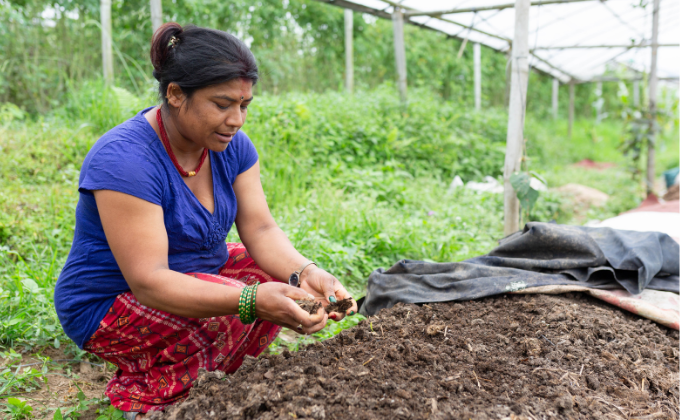
Shanti Shahi, a 37-year-old resident of Kalagaun in Salyan district, Nepal, faced many challenges in her life-long quest for economic empowerment. Like a lot of girls in the country, she had to discontinue her education after the ninth grade due to financial constraints and societal norms downplaying the importance of girls' education in Nepal and got married shortly after completing her schooling. Despite her and her husband’s efforts, they struggled to make ends meet for two decades while working various jobs.
In 2015, Shanti joined the Kharibot Manushi Women Group, supported by Manushi, an NGO partnered with CECI-Nepal. Manushi focuses on assisting underprivileged and marginalized individuals through training in various fields, including handicrafts and microenterprise development. While Shanti initially became a member to access financial services and obtain a loan, she discovered much more. From training to dedicated services and personalized advice, she was soon able to develop her activity and save money regularly.
But Shanti’s life took an even more positive turn a few years later, in 2022. Wanting to learn more about producing her own compost for her tomato cultures, she hosted and attended a two-day vermicomposting training session organized by Manushi and facilitated by CECI-Nepal. This training opened her eyes to the potential of vermicomposting in agriculture and led her to rethink her whole business plan.
Thanks to the workshop, Shanti was able to identify the most suitable earthworm species on her farm for compost production. She quickly managed to grow the 500g of earthworm received during the workshop up to approximately two kilograms, which served as the foundation for reproducing and selling them, along with the vermicompost they help produce.
In less than five months, Shanti generated NPR 14,000 (CAD 150) from vermicompost sales and currently possesses 20-25 kilograms of earthworms, equivalent to NPR 40,000-50,000 (CAD 400-500). She further expanded her vermicompost production by purchasing an additional 40 kilograms of earthworms.
Manushi, in partnership with CECI-Nepal, emphasizes the importance of investing in women's economic empowerment, believing it leads to gender equality, poverty alleviation, and inclusive economic growth. With Shanti’s success story in mind, they continue to offer coaching and mentorship to their members.